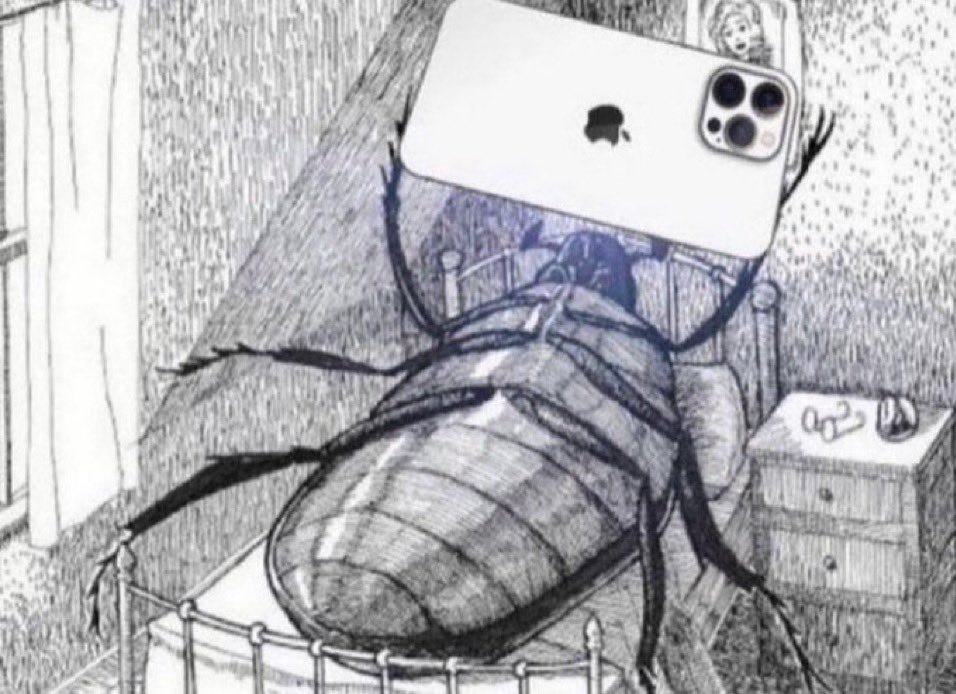Franz Kafka awoke one day in bed transformed - into a beetle. A great, chitinous monster with whirring legs and clicking mandibles atop the wood cot where he had gone to sleep the night before as a mild-manner Astro-Hungarian clerk. His family recoiled in horror at the sight - but it wasn’t because he was a bug, rather, because he had come out to them as a writer - an artist, a creative type, forgoing his steady stable and secure job clerkhood to be some undefined thing, some wandering poet, some pariah. Lodged in his back were the pithy reprobations of his father, festering like a wound for poor Franz, who was once the apple of his parents eye. Malnourished and desiccated, unceremoniously swept out with the trash, at least in the story. In reality he flourished and went down in history as a literary giant and inspired generations of authors since.
Thus the Kafka bug - one who rebels against structure and hierarchy and transforms themselves against the grain of the world into someone who is free-thinking and creative. Bugs are born free yet everywhere they are in nets - the tangled web of social expectations, the towering offices of social institutions, the hierarchical nature of political reality. Everywhere we turn, people belong to the Bugnet: a rigid, class-based system of rules and order, strict expectations, where people are interchangeable parts fit for single-purpose use.
The Bugnet is all around us to this day. Corporate drones, business consultants, tax accountants, lawyers, civil servants, essentially, the employees of any large organization who have clearly defined incentives, who are rule-abiding by nature, who perform their Bugnet functions and turn the wheels of industrial civilization at scale. See, despite the apparent wretchedness of Bugnet life, we need Bugnets to survive. They are the postal workers, the firefighters, the hospital staff, the city officers, the legal system. They are dependable, consistent, stable operators of essential functions that you rely on every day. They make the electrical grid run, the water flow, the planes land, and the grocery shelves full. Without Good Bugs making the Bugnet run, society collapses and we all revert to polyamory.
Who are the Kafka Bugs today, the free-thinking rebels? Artists, designers, content creators, sometimes scientists, sometimes entrepreneurs, sometimes people who work still inside large organizations - Kafka Bugs who have just not woken up yet but still lay dormant, asleep as clerks. Kafka Bug’s are defined not necessarily by their job but by their approach to life: agentic, in control, independently minded, operators of their own destiny.
When a Kafka Bug becomes an entrepreneur however, or a world-builder of any kind like non-profits, art institutes, scientific research labs, they begin to face a difficult thing. How do I scale my unique essence, my distinct ‘thing’ that makes me not fit into existing molds and hierarchies? How do I train others to be extensions of myself?
At first it’s all about hiring people who are also Kafka Bugs. Early stage startups are often like the Mongolian warriors of Ghengis, each member an independent competent operator, generalist by nature, all taking on an evolving and chaotic assortment of responsibilities and just getting shit done in the midst of absolute chaos. They thrive in uncertainty and ambiguity, they take charge in the lack of directions or orders, and resourcefully make do with whats available to get closer to goals that are poorly defined and changing in time.
But there comes a time when the organization scales beyond what any one tribe of Mongols can sustain, when it needs procedures, rules, department heads, reporting duties, standing meetings, and so on. Once a free-thinking land of creatives, the organization inexorably establishes a new Bugnet, something that would feel crushing and stifling to any Kafka-would-be creative trapped within. And atop any Bugnet there is the Bug-Master, the Gwynne Shotwell to the Kafka-Elon, the person who “actually keeps the ship together” against the constant injection of entropy and chaos that comes from the metamorphosed. Often, the original builder of that Bugnet is eventually replaced, sometimes hostiley by a board, other times voluntarily. In comes an experienced CEO, someone who rose the ranks of the Fortune 500. The Bugnet now belongs to the Bugs, and not the kind who woke up transformed.
The is the Duality of the Bug. To escape our procedural, organized, rule-based lives and find our true selves we must risk becoming an abhorrent, strange thing to those who still live in the Bugnet. And to realize our grand ambitions, to scale ourselves beyond the reach of one individual, we must too build a Bugnet around us. What escapes the Bugnet becomes the Bugnet. And if you find yourself netted but not yet free, be a Good Bug. The word depends on it.





Beautiful writing.